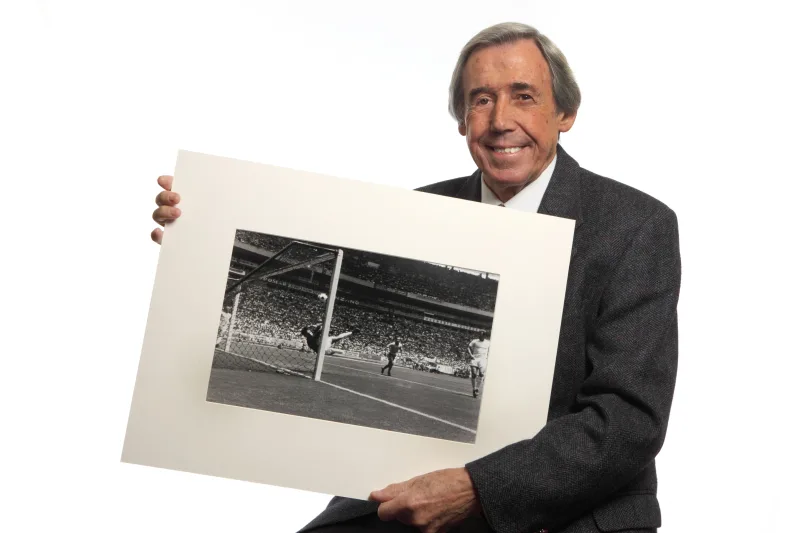From Banks' historic denial of Pele, to Green's mistake against the USA in South Africa, our model works out how some the most significant saves and mistakes rank…
The work of Goalkeeper xG is making waves in football today, but what does its data suggest about some of the most notable goalkeeper saves and mistakes in the last few decades?
It's important to remember that the model is ranking each goalkeeper action against a mathematically average current Premier League goalkeeper. However, this analysis does give an insight into, comparatively, how impressive (or not) certain saves were. Likewise, it poses a question: just how do the great goalkeepers of a few decade ago stand up against today's top flight crop?
Up first, the saves:
David Seaman vs Sheffield United, 2003
Seaman's stop from Paul Peschisolido in Arsenal's 2003 FA Cup Semi-Final against Sheffield United at Old Trafford is one pulled out of the archive whenever the Gunners progress to a certain round of the hallowed English competition. And for good reason; Seaman's stunning reflex looks incredible - and was pretty incredible.
The Goalkeeper xG model finds that this save had a 31.4% Save Probability, meaning around one third of today's ‘average’ Premier League goalkeepers would make the save.
Iker Casillas vs Holland, 2010
Until Emiliano Martinez denied Randal Muani in the dying embers of the world's biggest match just before Christmas, Iker Casillas' similar stop from Arjen Robben in South Africa 12 years earlier was arguably the ‘save of the century’.
Goalkeeper xG finds the Spaniard's World Cup-saving stop draws a 53.6% Save Probability number. Just over half of average Premier League goalkeepers would make the save mathematically, but to do so in the last minutes of a game of that magnitude, with the scores level at 0-0, undoubtedly means Casillas' name in the history books will stay there for some time.
Gordon Banks vs Brazil, 1970
“My God, only players of that level would do what the two did! It was the perfect header. Banks thought the way Pelé did. When the ball bounced, if Banks would have tried to hold it, the ball would have passed him. It was like a volleyball play because he slapped the ball. He followed Pelé’s thinking. It was an incredible move that required two geniuses.”
Those were the words of World Cup ‘70 winner Rivellino who played in the tie between England and Brazil at Mexico’s Guadalajara stadium. He was referring to what is popularly considered the greatest save of all time. Pele, who sadly passed away late last year and dabbled in goal himself, would be the ultimate victor but Gordon Banks' heroic effort to keep out a bouncing header from O Rei has gone down in history despite England's exit.
The Goalkeeper xG model finds that, even today, an average Premier League goalkeeper makes that save only 27.5% of the time.
Iker Casillas vs Sevilla, 2009
Spain's legendary World Cup winner gets two features in this article. The earlier save, from Arjen Robben's effort, was a year subsequent to this magnificent example of athleticism and bravery. It was a Real Madrid shirt that Casillas was wearing this time round, and the save may not have become quite as world renown, but for those in goalkeeping circles it goes down - undisputedly - as a piece of goalkeeping that exemplified the standards Casillas brought to Los Blancos.
The Goalkeeper xG model finds this save to have save probability of just 13.9%.
But how about the other end of the spectrum; where do two of the most infamous goalkeeper errors rank on the model?
Rob Green vs USA, 2010
It's a moment that England fans will never forget, and Rob Green doesn't need reminding of. We won't dwell on the error that has become one of two equally memorable (for the wrong reasons) moments in South Africa for England, but the Goalkeeper xG model has Green's fumble down as a 99.5% Save Probability.
Massimo Taibi vs Southampton, 1999
It was always going to be a monumental task to live up to the standard that Peter Schmeichel set at Old Trafford. The Italian goalkeeper only played four games for Manchester United over the 1999/2000 season, and left for his home country at the end of the campaign - on his terms, not because of the error, as reported.
In reality, Taibi's United outings weren't all bad. He had won Man of the Match against Liverpool in the previous match, but, struggling with family issues and a language barrier, the Italian never settled in the north west.
The model finds that Matt Le Tissier's shot had a 99.8% save probability.








